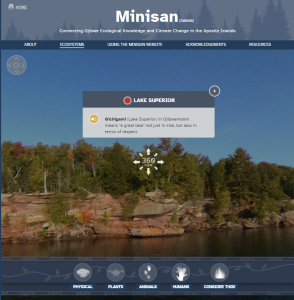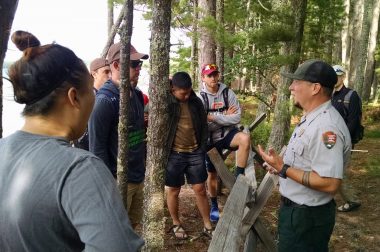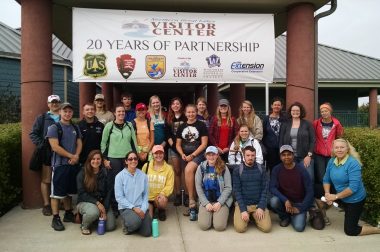Virtual: Minisan– Connecting Ojibwe Ecological Knowledge and Climate Change
Explore 12 different Apostle Islands ecosystems and learn how climate change is affecting the beings living there based on Ojibwe ecological knowledge integrated with “academic” climate science. Each ecosystem features stories of how climate change is affecting the Ojibwe four orders of creation (physical, plant, animal and human orders), plus a “consider this” challenge.
Minisan will challenge you to think differently about climate change and and what we can do to adapt to its impacts in our communities and cultures. www.minisan.org
In-Person Guided Field Courses
These multi-day field courses for organized groups of high school, college, and adult learners provide experiential learning that integrates traditional ecological knowledge of the Lake Superior Ojibwe people, place-based investigations, and leadership development that will challenge you to take action in your community and culture! Contact cathy.techtmann@wisc.edu for more information or to build your field course.
2025 Lake Superior Culture and Ecology Field Courses Being Planned Now!
2024 Field Courses
Carroll University “Ojibwe Culture and Ecology” Field Course, July 19-27 2024.
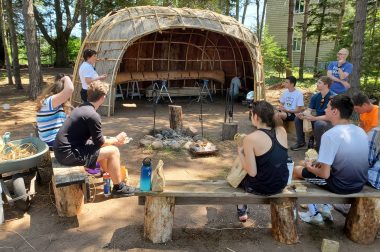
Carroll University students on Madeline Island learning about how climate is affecting Ojibwe culture.
This experiential 8-day field course explores historic and contemporary Ojibwe cultural and ecological relationships. Course experiences are taught by tribal and UW Extension specialists and includes cultural learning experiences within the Bad River and Red Cliff Tribal Nations, , at the Sandy Lake Memorial in Minnesota, the Voigt Task Force Meeting, within Wisconsin’s Lake Superior tribal communities. This course is offered in partnership with UW-Extension, the Great Lakes Indian Fish and Wildlife Commission, and Bad River and Red Cliff Tribes of the Lake Superior Ojibwe. Field course co-directors: Dr. Aaron Routhe-Carroll University and Cathy Techtmann-UW Extension. See what we learned: 2024-Carroll U Ojibwe Culture and Ecology Field Course
University of Wisconsin Stevens Point “Lake Superior Natural Resources, Culture, and Climate Change” field course, October 3-6 2024.
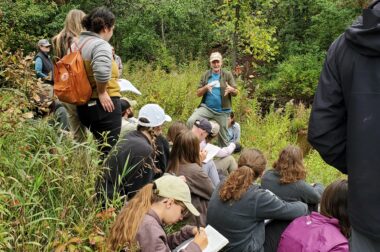
Kevin Brewster-Superior River Watershed Association demonstrates how properly sized culverts contribute to climate resiliency.
This annual 5-day field course integrates traditional ecological knowledge (TEK)of the Lake Superior Ojibwe and place-based observation, with “western” science to examine climate change impacts and adaptation strategies. This course takes a watershed scale approach with field experiences from Madeline Island to Iron County’s Saxon Harbor. Field course co-directors are Drs. Holly Petritto, Austin Holland, and Kendra Lindicoat from UW Stevens Point and Cathy Techtmann-UW Extension Environmental Outreach Specialist. Partners include the Great Lakes Indian Fish and Wildlife Commission, and Bad River and Red Cliff Tribes of the Lake Superior Ojibwe, the Superior Rivers Watershed Association, and Iron County, WI. See what we learned: 2024 UWSP Field Course Agenda
2023 Culture and Ecology Field Courses
Carroll University Ojibwe Culture and Ecology Field Course, July 21-28.
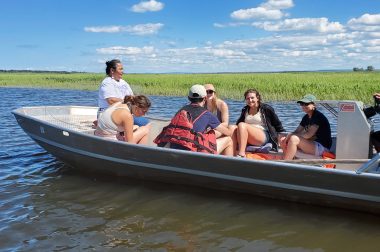
Students experience the importance of manoomin (wild rice) during a trip to the Bad River Tribe’s Kakagon Slough.
2023-Carroll U Ojibwe Culture and Ecology Field Course Agenda
2023 UW Stevens Point “Lake Superior Natural Resources, Culture, & Climate Field Course”,September 27-October 1.
2023 UWSP Field Course Agenda
“Climate Strong! Climate Leadership Professional Development Institutes
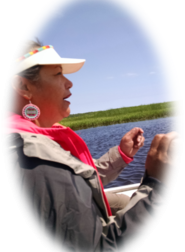 Climate Strong! Institutes teach formal and informal educators how to integrate indigenous ecological knowledge and place-based evidence of climate with “academic” science to promote climate awareness and action. Please jump over to our Climate Strong! Climate Leadership Initiative page for more details. Climate Strong! institutes are open to classroom and community educators or anyone who wants to build their climate literacy and leadership capacity, especially those serving tribal youth.
Climate Strong! Institutes teach formal and informal educators how to integrate indigenous ecological knowledge and place-based evidence of climate with “academic” science to promote climate awareness and action. Please jump over to our Climate Strong! Climate Leadership Initiative page for more details. Climate Strong! institutes are open to classroom and community educators or anyone who wants to build their climate literacy and leadership capacity, especially those serving tribal youth.
2022 Carroll University Ojibwe Culture and Ecology Field Course, July 22-29.
This experiential course is taught by tribal and UW Extension specialists and includes cultural learning experiences within the Bad River and Red Cliff Tribal Nations, the Great Lakes Indian Fish and Wildlife Commission, at the Sandy Lake Memorial in Minnesota, the Voigt Task Force, and within Wisconsin’s Lake Superior region. This course is offered in partnership with UW-Extension, the Great Lakes Indian Fish and Wildlife Commission, and Bad River and Red Cliff Tribes of the Lake Superior Ojibwe. Field course co-directors: Dr. Aaron Routhe-Carroll University and Cathy Techtmann-UW Extension. 2022 Carroll University Ojibwe Culture and Ecology Course Agenda.
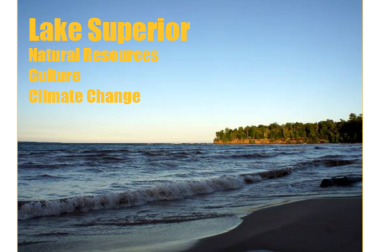 2019 UW Stevens Point “Lake Superior Natural Resources, Culture, and Climate Field Course for Professionals”, June 12-14
2019 UW Stevens Point “Lake Superior Natural Resources, Culture, and Climate Field Course for Professionals”, June 12-14
Within the Lake Superior basin, global climate change is expected to cause increased annual temperature, decreased snow, and more frequent and extreme weather events. Lake Superior tribal and coastal communities are already experiencing climate challenges and are implementing culturally relevant strategies to become more climate resilient. This workshop was designed for professional natural resource educators, Extension, and informal community educators. It focused on developing effective professional level communication and response strategies that integrate qualitative and quantitative knowledge to promote climate resiliency–no matter what the community, audience, or location. Click here to see this field course. Field course directors are Dr. Shiba Kar-UW Stevens Point and Cathy Techtmann-UW Extension.
2019 Carroll University “Ojibwe Culture and Ecology” Field Course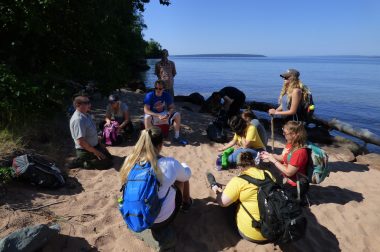
Carroll University offers this 5-day field course that integrates Ojibwe and indigenous ecological knowledge and culture to build a greater understanding of the environment and culture. This experiential course was conducted at field locations in tribal communities in Wisconsin and Minnesota in partnership with UW-Extension, the Great Lakes Indian Fish and Wildlife Commission, and Bad River and Red Cliff Tribes of the Lake Superior Ojibwe. Field course co-directors: Dr. Aaron Routhe-Carroll University and Cathy Techtmann-UW Extension. Checkout what we learned: 2019 Carroll University Culture and Ecology Field Course Agenda.
2019 UW-Stevens Point “Lake Superior Natural Resources, Culture and Climate” Student Field Course
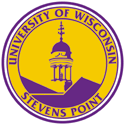
This field course integrates traditional ecological knowledge of the Lake Superior Ojibwe and place-based observation, with “western” science to examine climate change impacts and adaptation strategies. This course takes a watershed scale approach with field experiences from Madeline Island to Iron County’s Saxon Harbor. Field course co-directors are Dr. Cady Sartini-UW Stevens Point and Cathy Techtmann-UW Extension. Partners include the Great Lakes Indian Fish and Wildlife Commission, and Bad River and Red Cliff Tribes of the Lake Superior Ojibwe, and Iron County, WI. Here’s the agenda for this innovative field course: 2019 UWSP Student Lake Superior Natural Resources-Culture and Climate Change Field Course Agenda
2018 University of Wisconsin Global Health “Exploring Ecology, Culture, and Health in the Wisconsin Lake Superior Region” Field Course
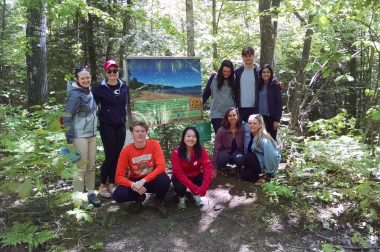
UW Global Health field course students learning about the connections between environment, culture, and health at Frog Bay Tribal Park, Red Cliff, WI
This 8-day field course challenged students to reflect on their current assumptions and worldviews of health and wellness and be changed by new ideas, viewpoints, and perspectives through a field immersion in the culture, communities, and landscapes of Wisconsin’s Lake Superior Region. They were introduced to Ojibwe cultural knowledge and community-academic partnerships with Wisconsin First Nations tribes, to explore ways they can take what they learned and apply for future engagement with First Nations communities and in their own culture. Field course learning locations include Bad River and Red Cliff tribal communities, Ashland, Bayfield, and Iron Counties, and Madeline Island. Field course co-directors: Dr. Heidi Busse-UW Madison and Cathy Techtmann-UW Extension. See what we learned in this field course: 2018 UW Madison Exploring Ecology, Culture and Health Field Course
2018 Carroll University “Ojibwe Culture and Ecology” Field Course
This cultural immersion experience integrates western science and traditional knowledge of the Lake Superior Ojibwe people to explore the inter-relationships between tribal sovereignty, culture, and sustainability of natural resources. Learning sessions include introduction to tribal sovereignty, Ojibwe language, impacts of cultural trauma, a wild rice cultural tour, experiencing how fire is being introduced as cultural tool in the management of
Stockton Island, participating in the Sandy Lake Memorial ceremonies, attending the Voigt Task Force meeting of Ojibwe tribal leaders, learning from tribal elders and natural resource experts, can culturally based service learning activities. Field course co-directors: Dr. Aaron Routhe-Carroll University and Cathy Techtmann-UW Extension.
2018 University of Wisconsin-Stevens Point Student “Natural Resources, Culture, and Climate Change” Field Course
Based on the G-WOW climate change model that integrates western climate science with traditional ecological knowledge of the Lake Superior Ojibwe, UWSP natural resource majors evaluated place-based evidence of a changing climate within the Wisconsin’s Chequamegon Bay region. This workshop is designed to expand climate change literacy by integrating climate science with place-based economic and cultural perspectives that resonate with learners and engage them in climate change mitigation or adaptive decision-making. UWSP students gained an understanding of climate impacts and needed adaptations in integrated natural resources management, decision-making, and developing culturally relevant climate responses.
This field course was supported by a grant from Sea Grant. Field course co-directors: Cathy Techtmann- UW Extension Drs. Shiba Karr, Cady Sartini, and Holly Petrillo-UW Stevens Point College of Natural Resources.
